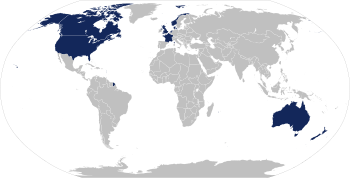I'm open to anything that:
1) makes things better for the US, and/or
2) makes things worse for China. I know
the idea of a Pacific NATO has been tossed around for years, but for various reasons--some of them very good--there's not a lot of momentum for it.
What would you suggest?
I like the idea behind it and think the whats and hows of it seem very interesting to explore.
I don’t think forming a NATO-style WESTPAC security alliance is feasible or advisable right now for addressing emerging security threats from East Asia. This is mainly due to the current geopolitical climate; the US’s strongest allies in the region all have more reasons to avoid joining that kind of a treaty than most of Western Europe did after WWII.
Currently, every single one of the major American allies in the Pacific has some crucial trading relationship with China, which in turn contributes to why few are either positioned or willing to join a Pacific analog to NATO – much less one with an Article V element. This is even before factoring in persisting tensions between some of these partners themselves over territorial claims (China Sea) and historical bad blood (S. Korea and Japan) that would preclude their cooperation in a joint security pact.
Most of these countries also don’t have the same urgent compulsion to form or join a collective security alliance against China because they’re not anticipating a Soviet-style armed invasion anytime soon a la post-WWII - even while they know China is making power moves.
At this point it would take a lot of diplomatic elbow grease and some important concessions to unify the majority of these major American allies in a security pact against a nation with that much economic leverage over all of them.
So, I think the way to make things better for the US and make things worse for China is to focus less on forming a multilateral security alliance and more on the areas of development that China has prioritized to successfully dissuade American allies from forming a Pacific NATO in the first place: economic and technological strength. China is a global competitor to the US in those spheres and is on the fast track to dominating them both, making US allies in the region further dependent on trade with and technology from China and even less incentivized to work on initiatives opposed by it.
I think Investing in trade relations with America’s Pacific allies is key to preventing further expansion of China’s control and influence over them. China’s new trade partnership has begun filling the economic power vacuum left by the TPP (which was itself initiated to check that same partnership in the first place) after the US backed out of it. I think investing in the current reworked TPP plan, along with expanding trade with regional countries that aren’t in in China’s trade partnership (not many), is a good first step to reestablishing American presence in the area and (hopefully) curbing economic dependency on China by its allies by providing them with better trade and technology options. The latter should be furnished by simultaneously ramping up investments in tech R&D.
Security-wise, I think the US can make some headway by using the structures they already have in place to make stronger security relationships with its Pacific allies. By these I mean everything from the Quad Dialogue (security forum between US Oz India & Japan), RIMPAC (Pacific war games), and even NATO itself through the extended partners (I forget the name) program to pull Pacific neighbors into more security discussions and collaborations.
To sum up, it needs to be multi-pronged and address the things preventing that sort of alliance from forming before bringing that discussion to the table.
ETA: I clicked the hyperlink in your post (was it there the whole time?) and noticed the author's analysis dovetailed with mine in some key areas. Apologies for the redundancy on some of those points!

